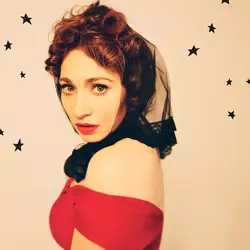 Regina Spektor
Regina Spektor"If I had a chance to say anything to the wonderful people reading this article," says Regina Spektor, with a giggle, "I'd say: do what I just did and delete Twitter and Instagram off your phone. You get so involved in this daily drama, you're riding the waves and the trends of outrage... You have to get off the ride sometimes, otherwise, you don't realise that you're riding a rollercoaster 24 hours a day."
"Artists," Spektor continues, "get into this panic: 'We have to be on this, we have to interact, people will get upset if they don't have access to us!' But, we're not politicians, we're musicians. If [my fans] really care about me, wouldn't they want me to have this music playing in my head, and have the space to go into my inner world, and have this song to bring them back to share? Rather than having me click a little heart, or retweet something, or provide something? I'm not a provider, I'm a bringer-backer. In order to bring things back, to be creative, I have to be freed from these bounds."
The 38-year-old, who grew up a Russian immigrant in New York and broke out with her third album, 2004's Soviet Kitsch, is about to set out work on her eighth LP, the follow-up to 2016's Remember Us To Life. Since her last record's release, Spektor has spent much of the time playing solo; which is how she'll perform on her imminent Australia tour, her first since 2012.
It's the first time she's played without a band since her salad days in New York's anti-folk scene. Initially playing solo, for Spektor, "felt like using a pencil when I had oil paintings in my head; everything had to be a sketch", but her recent shows have felt liberating. "When you're playing solo, you don't have to listen to anyone else," she enthuses. "[I love] that feeling of just being in my own space-and-time, just with the songs and the audience... I love to stretch time, to move it and shape it, and you can only do that so much with other musicians."
Don't miss a beat with our FREE daily newsletter
In the studio, Spektor sees herself as "a scientist, conducting experiments". But she never writes songs, or makes albums, with any conceptual ideas. When she's writing "homework music" - like the songs she's written for Orange Is The New Black and Chronicles Of Narnia: Prince Caspian, or collaborations and covers - she has a sense of how they'll turn out. When she's just writing songs for her own records, she has no idea.
"Songs, to me, tend to be a pretty mysterious expression," Spektor says. "You process the world and then something bubbles up, and you don't know exactly why those words are happening, you just feel around until it feels like a tiny sliver of truth. It can remain mysterious, or be fiction, just as long as it feels true."
Spektor is fascinated with how other people interpret her songs. "That's the beauty of art, it just travels," she marvels. "People project meaning onto things, and usually that has to do with themselves. I don't even think songs or records are the kind of things you can get wrong. It could be all of that, or it could be none of that."
Though her "emotions and soul and intellect" are plied into her songs, Spektor thinks "they float around in this way that's hard to connect it back to me in a tangible way". Which means that she's naturally wary of those who demand to know more of her life via social media. "They feel entitled with an artist that they think they care about, but what they really care about is getting what they want out of them," Spektor says. "So, you have to figure out what you're ok with. Are you ok with people not getting what they want from you? Or do you need to give everybody what they want?"
"I'm not an art waiter. I'm not here to bring you your order: 'Um, I'll have a little bit of personal life, along with some political involvement, but not about that issue, please don't talk about that.' I'm not going to do that. In my music, I pledge allegiance to my inner-self."

















